Tabernacles Feast
of THE MOST JOYFUL FEAST ON GOD’S CALENDAR

The International Christian Embassy Jerusalem was established in1980 in recognition of the biblical significance of all of Jerusalem and its unique connection to the Jewish people. Today the ICEJ represents millions of Christians, churches, and denominations to the nation and people of Israel. We recognize in the restoration of Israel the faithfulness of God to keep His ancient covenant with the Jewish people. Our main objectives are:
• To stand with Israel in support and friendship
• To equip and teach the worldwide church regarding God’s purposes with Israel and the nations of the Middle East
• To be an active voice of reconciliation between Jews, Christians, and Arabs, and to support the churches and congregations in the Holy Land
From its head offices in Jerusalem, the ICEJ reaches out into more than 170 countries worldwide, with branch offices in over 90 nations.
Our vision is:
• To reach every segment of Israel’s society with a Christian testimony of comfort and love
• To reach and actively represent to Israel the support of denominations, churches, and believers from every nation on Earth
The Christian Embassy is a non-denominational faith-based ministry supported by the voluntary contributions of our partners and friends across the globe. We invite you to join with us as we minister to Israel and the Jewish people worldwide by donating to the ongoing work and witness of the ICEJ.
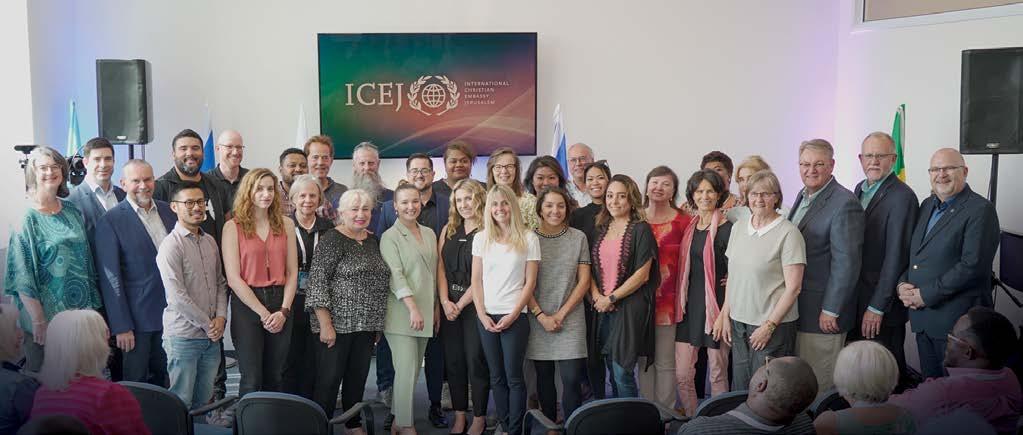

WORD
CREDITS

ICEJ President Dr. Juergen Buehler
USA Director Susan Michael
VP International Affairs Dr. Mojmir Kallus
VP Finance David van der Walt
VP Operations Barry R. Denison

VP International Spokesman David Parsons
VP AID & Aliyah Nicole Yoder
Managing Editor/Publications Director Laurina Driesse
USA Managing Editor Karen Engle
Staff Writer Anastasiya Gooding
Graphic Design/Illustrators Ryan Tsuen, Peter Ecenroad, Nancy Schimp
Photography Shutterstock, Adobe Stock, AP, AFP, JAFI, Flash90, Haaretz, Reuters, IDF, businessweek.com, Netafim, newatlas, SanDisk, Watergen, Waze, Wikimedia Commons, Levi Dörflinger, John Theodor, ICEJ Staff and Branches
The New King James Bible is used for all Bible references unless otherwise noted.
Word From Jerusalem is published by the International Christian Embassy Jerusalem. Reproduction in whole or in part without written permission is prohibited. Word From Jerusalem has no subscription price and is supported through contributions worldwide. The ICEJ USA Branch is a 501(c)(3) non-profit organization with offices in Tennessee, Florida, and Washington, DC. All gifts to this ministry are tax-deductible according to United States law.
INTERNATIONAL CHRISTIAN EMBASSY JERUSALEM - USA
Support our ministry online at: www.icejusa.org
FROM THE PRESIDENT'S DESK
Dear friends,
This year’s Feast theme comes from the book of Psalms, where the sons of Korah declare: “For God is the King of all the earth; sing praises with a psalm!” (Psalm 47:7 ESV). We also see this bold proclamation earlier in this “enthronement psalm,” when the writer declares: “For the LORD, the Most High, is to be feared, a great king over all the earth” (Psalm 47:2).
Despite this truth, we live in a world of darkness and subsequent difficulty. Evil is made to seem good, and good, evil. Artificial Intelligence is here to stay, and with it, a dark side. Global challenges, such as growing inflation rates, are serious causes for concern. Some are using the World Court of Justice to paint Israel as an apartheid state, which will lead to more boycotts and saddle Israel with pariah status.
Antisemitism and anti-Israelism are rising in most post-Christian countries, in part because of repackaged lies and conspiracies (“tropes”) about the Jewish people that existed even before the Holocaust. In this issue of Word From Jerusalem, you’ll learn about antisemitic tropes—what they are and the critical role they play in increasing antisemitism (p. 18).
But you’ll also be encouraged by the reminder that God is still on the throne. In my article “Heaven Reigns! The Lord is ‘King of all the Earth’” (pp. 8–10), I will unpack what it means to set our eyes on the eternal Kingship of Jesus while living in this chaotic world. And you’ll explore an in-depth teaching on the Feast of Tabernacles (pp. 4–7)—God’s instruction for this feast in the Old Testament, what it looked like in Jesus’ day, and what we are looking forward to when Jesus fulfills it to perfection.
And it’s not too late to sign up for the online 2023 Feast of Tabernacles, “King of All the Earth,” at www.icejfeast.org. I hope you’ll join us! The content will be available to watch on demand for several months.
Many blessings from Jerusalem!
Dr. Juergen Buehler President
International Christian Embassy Jerusalem
COVER PHOTO: Jewish worshipper with his lulav during the Feast of Tabernacles
FOR MAGAZINE ARCHIVES visit www.icejusa.org/wfj

Tabernacles Feast of THE MOST JOYFUL FEAST ON GOD’S CALENDAR
JERUSALEM
FROM
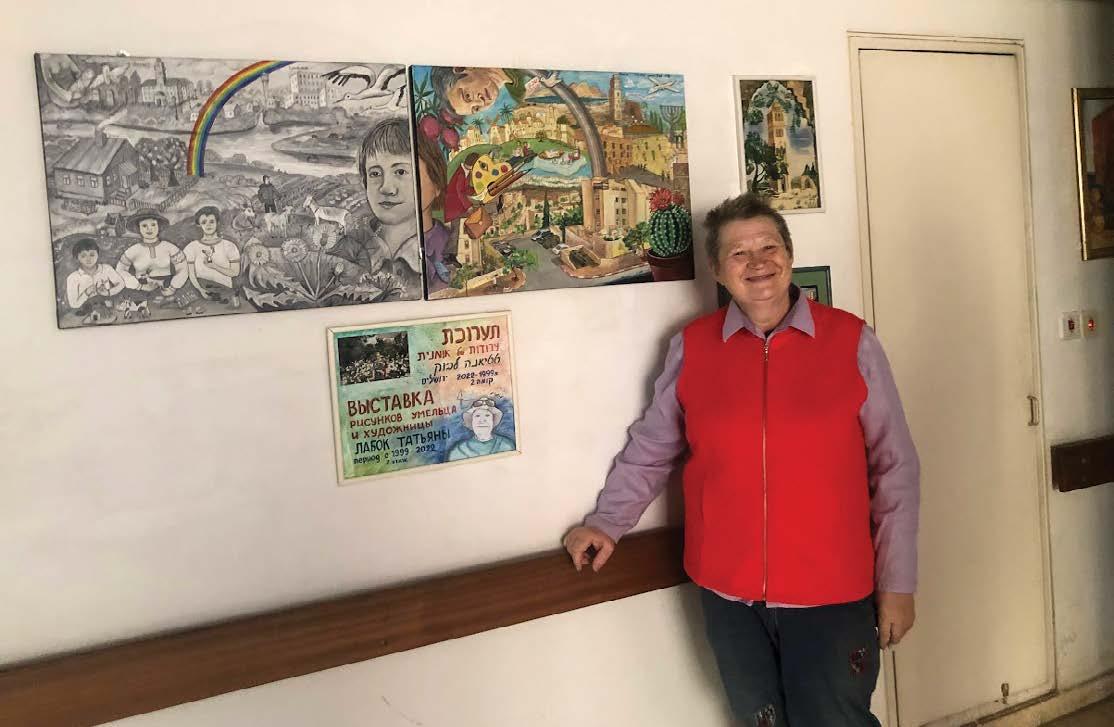


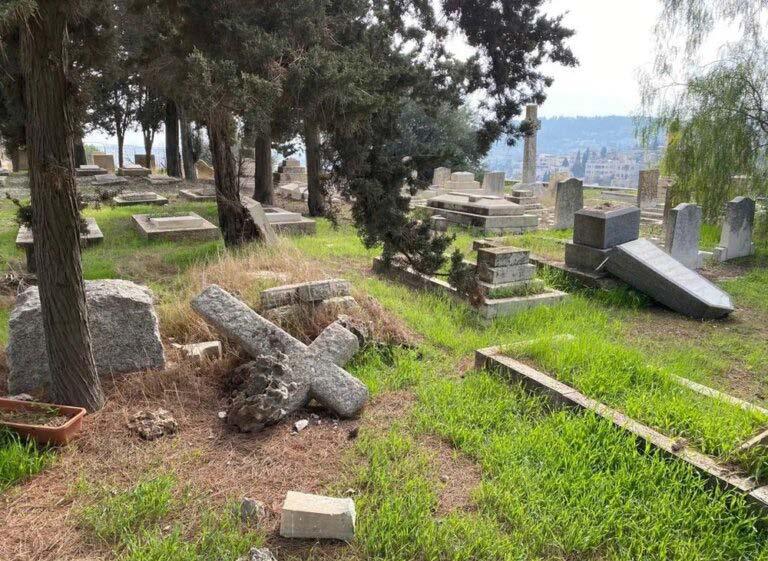
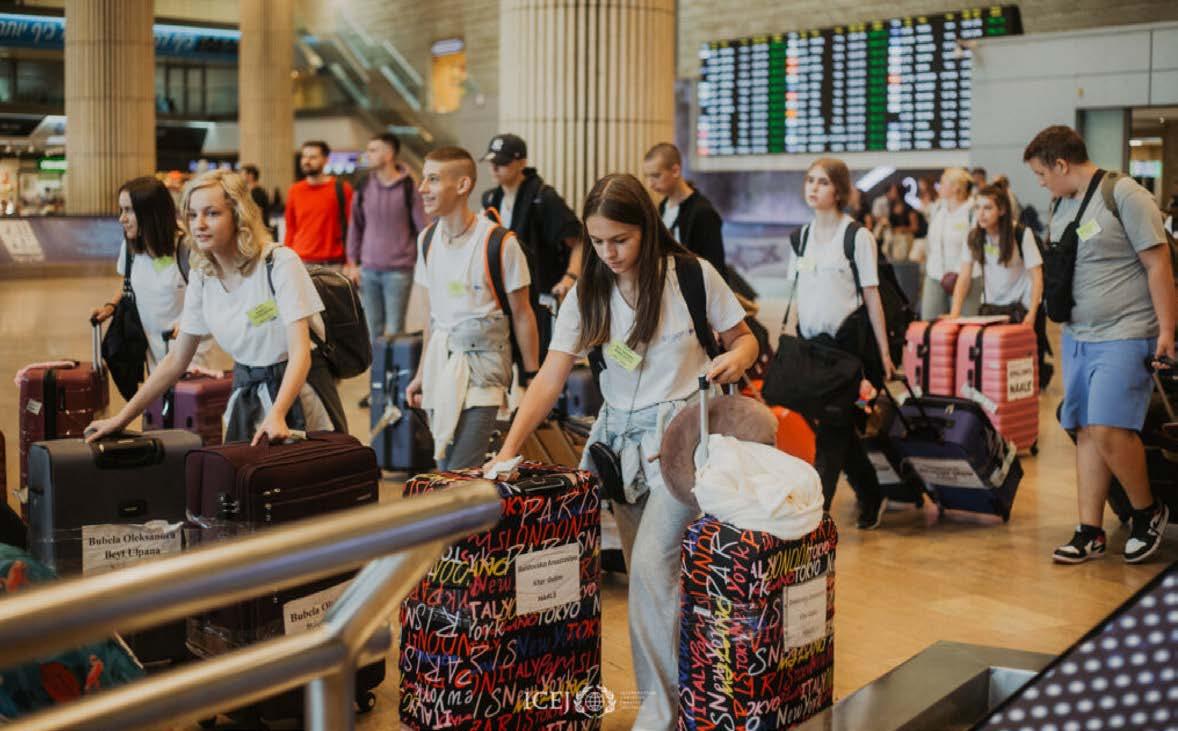
CONTENTS OCTOBER 2023 USA EDITION 4 FEATURED TEACHING THE MOST JOYFUL FEAST ON GOD’S CALENDAR UNDERSTANDING THE FEAST OF TABERNACLES (SUKKOT) HEAVEN REIGNS! THE LORD IS “KING OF ALL THE EARTH” 8 11 ISRAELI LEADERS EMBRACE CHRISTIAN SUPPORT FOR ISRAEL PUTTING COLOR BACK IN TANYA’S LIFE 16 14 ICEJ BRINGS UKRAINIAN YOUTH ON LATEST ALIYAH FLIGHT 4
On the fifteenth day of the seventh month, when you have gathered in the fruit of the land, you shall keep the feast of the Lord for seven days; on the first day there shall be a sabbath-rest, and on the eighth day a sabbath-rest. And you shall take for yourselves on the first day the fruit of beautiful trees, branches of palm trees, the boughs of leafy trees, and willows of the brook; and you shall rejoice before the Lord your God for seven days. You shall keep it as a feast to the Lord for seven days in the year. It shall be a statute forever in your generations. You shall celebrate it in the seventh month. You shall dwell in booths for seven days. All who are native Israelites shall dwell in booths, that your generations may know that I made the children of Israel dwell in booths when I brought them out of the land of Egypt: I am the Lord your God.”
—Leviticus 23:39–43
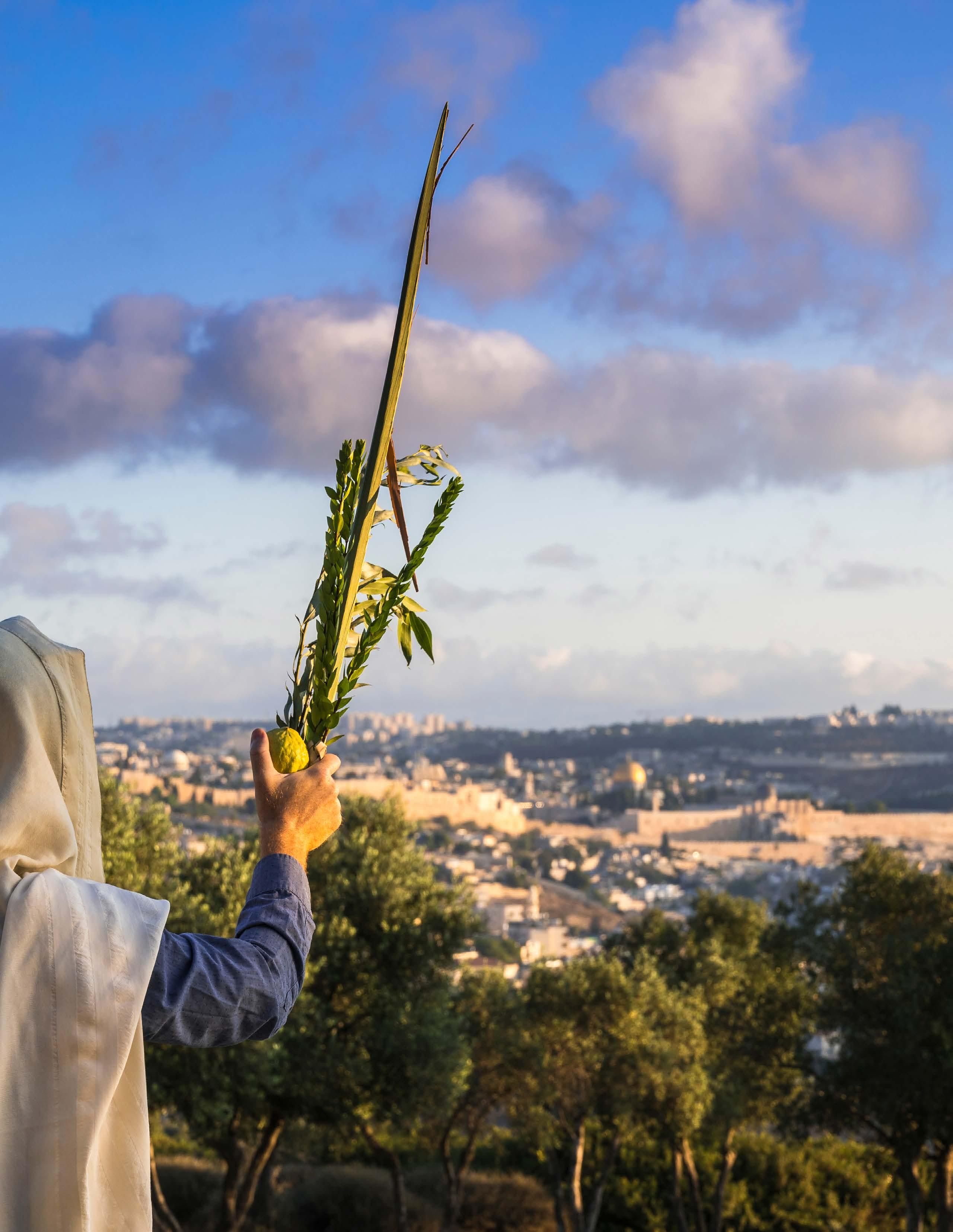
Tabernacles Feast of
ICEJ TEACHING
“
KAREN ENGLE, ICEJ MANAGING EDITOR
THE MOST JOYFUL FEAST ON GOD’S CALENDAR
Among many interesting declarations Jesus made during the last months of His life on Earth were two found in the book of John.
T he first is 7:37–38, when Jesus tells His listeners that if anyone thirsts, they should come to Him and drink and that those who believe in Him will have “rivers of living water” flow from their hearts. Most Bible-readers recognize this as pointing to the Holy Spirit, who would come just a few months later after Jesus’ ascension to heaven. Then in John 8:12, Jesus proclaims that He is the “light of the world” and that whoever follows Him will not walk in darkness but have the light of life. This recalls Bible passages connecting light and truth—and how Jesus is the reality of what that means.
over His provision that year. It was the most joyful of all seven feasts, and because Jewish people in Jesus’ day believed the messianic kingdom would be fulfilled during this time, it came to be known as “The Time of Our Rejoicing.” Leviticus 23:41 says it was to be a statute forever, kept throughout all generations. The Feast of Tabernacles marked the end of the biblical feasts calendar that started with Passover in the spring. In Hebrew, it’s the word Sukkot, which means “a hut, temporary dwelling, or tent.” This is because back in Leviticus, God also told His people to construct temporary shelters
crops they had been watching and waiting for all summer, which included the last wheat, olive, and grape harvest, vital for Israel because it produced bread, olive oil, and wine. For this reason, Tabernacles is also known as the “Feast of Ingathering.”
“That I May Dwell among Them”
Of the Lord’s seven feasts or “appointments” detailed in Leviticus 23, He set aside three as “pilgrimage” feasts: Passover, Pentecost, and Tabernacles. For these feasts, God required all males to travel to the temple in Jerusalem where they were to offer sacrifices: “Three times a year all males must appear before the Lord your God at the place he will choose: at the Festival of Unleavened Bread, the Festival of Weeks and the Festival of Tabernacles” (Deuteronomy 16:16).
But if we don’t understand the first-century context in which Jesus spoke those words, we miss the deeper, profound significance of what He was communicating.
And that context was the Feast of Tabernacles.
B efore unpacking those pieces of New Testament Scripture in John, let’s first consider the Feast of Tabernacles in the Old Testament and God’s instruction for Israel for how to keep this last and greatest feast on the biblical calendar.
The Feast of Tabernacles in the Old Testament
After all the sacrifices were completed on the Day of Atonement—which cleansed God’s people, the priesthood, and the earthly tabernacle of impurities—the children of Israel looked toward another year knowing their sins were covered, albeit temporarily. But one feast remained to round out the seven feasts or “appointments” God initiated at Mount Sinai: the Feast of Tabernacles. It began five days later, on the fifteenth day of the seventh month of Tishri—our September/October. This year Tabernacles falls on September 29 through October 6.
During this seven-day feast, God required specific offerings and sacrifices, as well as special Sabbaths on the first and eighth days. It was the third and last “pilgrimage” feast, where God instructed Jewish men to travel to the temple in Jerusalem to celebrate it and rejoice
made of boughs, called sukkahs or “booths,” and required His people to eat and sleep in them for all seven days.
Living in sukkahs reminded God’s children of when they lived in tents surrounding the tabernacle (where God’s presence dwelt) while in the wilderness after leaving Egypt, picking up and moving on as necessary to follow God’s presence while journeying toward their more permanent home in the promised land. Even today in Jerusalem, as this feast draws near, sukkahs appear everywhere—outside apartment windows, in front of restaurants, in backyards— often colorfully decorated with fall fruits and palm fronds.
The concept of God tabernacling among His people goes back to Mount Sinai when He instructed Moses to build a structure for Him to dwell in—the tabernacle in the desert and, later, the temple in Jerusalem. However, God’s people slid into idol worship, and after centuries of ignoring warnings from God’s prophets to turn from such abominable worship, judgment came: the glory of God retreated from His dwelling in the temple sanctuary, and the Babylonians deported the Jewish people and destroyed Jerusalem. And without a temple, God’s people could no longer worship Him appropriately.
In their despair, prophets like Ezekiel encouraged the children of Israel: there was hope! One day, God would not only bring them back to the land from where they had been scattered and comfort them (Isaiah 51:3 and 52:9), but His glory—His presence—would return to the temple:
And behold, the glory of the God of Israel came from the way of the east. … And the glory of the Lord came into the temple by way of the gate which faces toward the east. The Spirit lifted me up and brought me into the inner court; and behold, the glory of the Lord filled the temple. (Ezekiel 43:1, 4–5)
However, though some Jews returned to Jerusalem after their release from Babylonian captivity, God’s presence did not return to the temple. Every generation since looked forward to the day when Ezekiel’s words would come to fulfillment—especially during the Feast of Tabernacles when they remembered their ancestor’s time in the desert when God’s presence dwelt among them. This was the state of things in Jesus’ day.
The tabernacle in the wilderness, and plan of the encampment (source: commons.wikimedia.org)

But this feast had another requirement: before they could celebrate it, God required Israel to bring in their final fall or “latter” harvest—the
The Feast of Tabernacles in the First Century
While Jesus walked this earth, Tabernacles was a sight to behold. Jews traveled from surrounding nations to gather in Jerusalem for the seven-day celebration and stay with friends or relatives who
ICEJ TEACHING
5 |WORD FROM JERUSALEM
had pitched tents on rooftops or in courtyards or set up sukkahs on the hills and towns surrounding Jerusalem.

The people would also hold, wave, and shake a branch of myrtle, willow, a bough of the palm tree, and citron (a lemon-like fruit)—materials also used to construct the sukkahs, as described in Leviticus 23:40. Today it’s called the “lulav” and “etrog,” and it was an act of praise to God for the bountiful harvest.

God’s command to rejoice before Him was manifest in singing and music performed by the Levites in the temple throughout the festival.
Among these and many other traditions that had developed before the destruction of the temple in AD 70, two stand out that were in effect—and those traditions breathe life into the words Jesus spoke in John 7 and 8 about being “living water” and a “light to the world.”
The Water Libation Ceremony
Each morning during Sukkot, at dawn, the Jewish priests, with torches in hand, descended the Temple Mount accompanied by sounds of trumpet blasts to the Pool of Siloam, a freshwater pool in the heart of the City of David fed by the Gihon Spring. A priest would use a golden flask to draw pure water from the spring and give it to another priest to carry back up the long road to the Temple Mount area, where it was poured out simultaneously with wine from another jug on the stone altar in the temple courtyard while singing Psalm 118:25, pleading for God to “Save now—Hosanna!”
All this occurred amid extravagant joy with Scripture like Isaiah 12:3 in mind:
Behold, God is my salvation; I will trust, and will not be afraid; for the Lord God is my strength and my song, and he has become my salvation. With joy you shall draw water from the springs of salvation.
These words in Psalm 118 and Isaiah 12 acknowledged God as Israel’s Savior, so knowing this context sheds incredible light on the significance of Jesus’ words in John 7. According to John, the Jewish festival of Tabernacles was near. Jesus had secretly left the Galilee and had been teaching throughout the Feast, causing great dissent. Then, on the
seventh day of Sukkot, the last and greatest day of the Feast—after seven days of the priests performing the water pouring ceremony—Jesus stood and said in a loud voice:
Let anyone who is thirsty come to me and drink. Whoever believes in me, as Scripture has said, rivers of living water will flow from within them. (John 7:37–38)
Those listening knew Jesus was referencing Scripture like Isaiah 12:3, as well as Isaiah 51, in which the prophet called Israel to salvation and to seek God while He could be found: “Come, everyone who thirsts, come to the waters, and he who has no money, come, buy and eat! Come, buy wine and milk without money and without price” (v. 1).
Years later, the apostle John would echo those words in Revelation 22:17: “Let the one who is thirsty come; let the one who desires the water of life without price.” John’s words pointed to an eschatological time when “living water” will flow from the temple and God will be King over the whole earth (Ezekiel 47:1; Zechariah 14:8). That “living water,” however, would not be from water poured out by the priests in the earthly temple—that was a mere shadow of what was to come.
That day in Jerusalem, Jesus was declaring He was Israel’s “living water,” her Savior—God’s presence in human form. Indeed, the following spring, Jesus (whose very name means “God saves”) would enter the temple through the East Gate just a few days before Passover (Palm Sunday) on a donkey’s back and be hailed as Messiah among declarations of “Hosanna!” from Psalm 118: “Save now!”
And indeed He would. Just a few days later, Jesus would be crucified, taking on the sins of the world, and quenching spiritual thirst for anyone who would believe.
Little did Israel’s leaders realize that as they performed the water pouring ceremony each day during Tabernacles and declared God as their salvation, their salvation was in their midst.
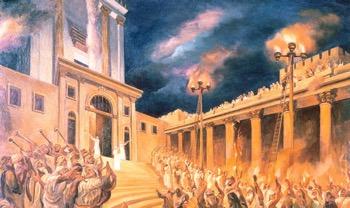
The Temple-Lighting Ceremony
Then, every evening during the Feast, priests carried jars of oil up ladders leading to four massive 75-foot menorahs in the temple courtyard that they lit, illuminating the entire courtyard with light that spilled out into Jerusalem’s streets and among the temporary
sukkahs. Because Jerusalem is on a hill, the glow could be seen even outside the city.
Entire families participated in the celebration, dancing for joy and singing. It was a visual reminder of Israel’s time in the desert when God’s presence was literally among His people in the form of a pillar of cloud and fire that hovered over the tabernacle. Throughout the Old and New Testaments—from the burning bush to the pillar of fire that rested on the tabernacle to the divided tongues at Pentecost— light has always been a sign of God’s revelation and presence.
OF TABERNACLES
OTHER NAMES FOR THE FEAST
The Time of Our Rejoicing
The Season of Our Joy Feast of Booths
The Feast of the Nations
The Feast of Ingathering Festival of Harvest
The Feast
T he Jews knew God had promised to send a light, a messiah, to their sin-darkened world. This messiah would renew Israel’s glory and release them from bondage, thus restoring their joy, and this concept was especially in focus during Tabernacles. The temple-lighting ceremony was thus anticipating the return of God’s presence to the temple, as Ezekiel had promised. Even surrounding nations took part,
6 | OCTOBER 2023 ICEJ TEACHING
Temple-lighting ceremony (source: Temple Institute)
coming to watch and listen.
It was within this context that Jesus stood up on the day after the last day of Tabernacles, the eighth day known today as “Shemini Atzeret,” and said: “I am the light of the world. He who follows Me shall not walk in darkness, but have the light of life” (John 8:12).
Like the water libation ceremony, those who heard those words knew what Jesus was declaring: He was the presence of God in their midst, the fulfillment of Isaiah 9:1–3. The Jewish people were walking in darkness and “dwelt in the land of the shadow of death,” but now upon them, “a light has shined.”
The Future Fulfillment of Tabernacles
Isaiah calls us to remember the former things of long ago and that God makes known the end from the beginning, from ancient times what is to come (Isaiah 46:6–10). Indeed, God told us about many profound events happening in our day long ago in His Word—including things like the return of Israel to her promised land and what we can look forward to in the fulfillment of Tabernacles.
This last feast on God’s calendar points toward a coming day when, after Israel’s Messiah returns to the Mount of Olives, He will again
enter Jerusalem through the East Gate— this time not as a suffering servant about to be crucified but as conquering King. God’s presence will once again dwell among His people Israel, just as the Ezekiel foretold:

I will establish them and increase their numbers, and I will put my sanctuary among them forever. My dwelling place will be with them; I will be their God, and they will be my people. (36:26–27 NIV)
Perhaps most profoundly, Zechariah says the nations will come up to Jerusalem every year to celebrate Tabernacles and appear before the King of kings:
And it shall come to pass that everyone who is left of all the nations which came against Jerusalem shall go up from year to year to worship the King, the Lord of hosts, and to keep the Feast of Tabernacles. (14:16)
As ICEJ USA Director Susan Michael says, “Though the fulfillment of Zechariah’s prophecy is for a future era, we are practicing for it now and preparing the way for amazing days to come.” It will be a day when Israel is spiritually restored and will experience unparalleled joy knowing her sin is forgiven and her King reigns.
God’s “harvest” of believers will be brought in, Jews and gentiles, one in Christ. Living waters will flow from Jerusalem, and there will be no light, for the Lord Himself, the “light of the world,” will be there (Zechariah 14).
T he apostle John says of that day:
T herefore they are before the throne of God, and serve Him day and night in His temple. And He who sits on the throne will dwell among them. They shall neither hunger anymore nor thirst anymore; the sun shall not strike them, nor any heat; for the Lamb who is in the midst of the throne will shepherd them and lead them to living fountains of waters. And God will wipe away every tear from their eyes. (Revelation 7:15–17)
Behold, the tabernacle of God is with men, and He will dwell with them, and they shall be His people. God Himself will be with them and be their God. (Revelation 21:3)
With Israel restored to her proper place as a priesthood for the nations, God will once again dwell with His people in the city of the Great King—truly a joyous day for all who know Him.
S hemini Atzeret and Simchat Torah
KAREN ENGLE, ICEJ MANAGING EDITOR
Shemini Atzeret occurs the day after Sukkot’s last (seventh) day. In Hebrew, shemini means “eighth” and atzeret means “assembly,” so Shemini Atzeret means “eighth day of assembly.”
It is a holy day connected to Sukkot but also a separate festival that, in Second Temple times, marked the beginning of Israel’s rainy season. It also involved cleansing the altar of sacrifice, but this effort ended with temple’s destruction in AD 70. Shemini Atzeret is always mentioned within the context of Sukkot in the Bible, as in Leviticus 23:26 and 39:
For seven days you shall offer an offering made by fire to the Lord. On the eighth day you shall have a holy convocation, and you shall offer an offering made by fire to the Lord. It is a sacred assembly, and you shall do no customary work on it. … Also on the fifteenth day of the seventh month, when you have gathered in the fruit of the land, you shall keep the feast of the Lord for seven days; on the first day there shall be a sabbath-rest, and on the eighth day a sabbath-rest.
T hough linked to Sukkot, God gave Israel different instructions for how to celebrate it, and unlike the other seven days, it was without sukkahs, lulav, and etrog.
Another feature of Shemini Atzeret that developed in rabbinical Judaism as part of the eighth-day celebrations is called Simchat Torah, which marks the conclusion of Israel’s annual Torah readings. It is the only time where the Torah scrolls are taken out of the ark (a chamber that houses the scrolls) at night, paraded throughout the synagogue, and read. The next morning, the final section of Deuteronomy is read followed by the first words of Genesis, kicking off the new reading cycle. For both, when the ark is opened, worshippers dance, sing, and celebrate with exceeding joy, often for several hours.
Interestingly, on Simchat Torah, the entire Jewish community assembles, comes into direct contact with Torah, and expresses deep joy in having received it—a beautiful picture of the joy that will be experienced with the return of Jesus, our Living Torah.
ICEJ TEACHING
7 |WORD FROM JERUSALEM
HEAVEN REIGNS! THE LORD IS “KING OF ALL THE EARTH”
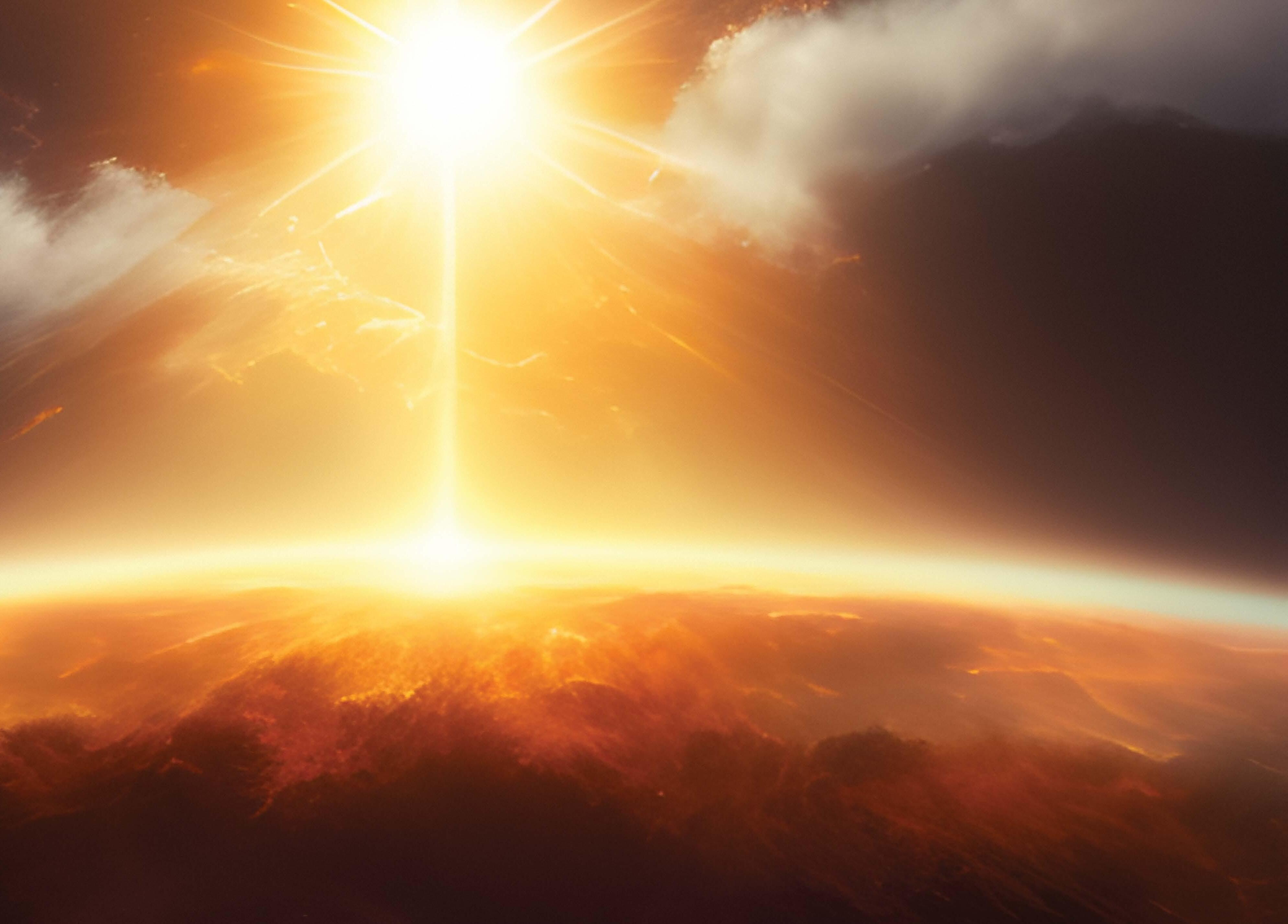 BY DR. JUERGEN BUEHLER, ICEJ PRESIDENT
BY DR. JUERGEN BUEHLER, ICEJ PRESIDENT
This year’s Feast theme comes from the book of Psalms, where the sons of Korah declare: “For God is the King of all the earth; sing praises with a psalm!” (Psalm 47:7 ESV [throughout]). We also see this bold proclamation earlier in this “enthronement psalm,” when the writer declares: “For the LORD, the Most High, is to be feared, a great king over all the earth” (Psalm 47:2).
For both Jewish and Christian interpreters, verse 5 is a key to understanding the context of this royal Psalm. “God has gone up with a shout, the Lord with the sound of a trumpet” (Psalm 47:5). Jewish commentators consider the phrase “God has gone up” to be a reference to the story of King David bringing the Ark of the Covenant from Obed-Edom’s home in Kiriath-Jearim, a village close to today’s Abu Gosh on the western ascent to Jerusalem (see 1 Chronicles 15). The Lord is enthroned upon the cherubim covering the Ark (2 Samuel 6:2; Psalm 99:1; etc.), and made His way to Jerusalem—the place that He chose as a habitation out of all the tribes and where He put His name (Deuteronomy 12:5).

Jerusalem became not only the capital of David, king of Israel, but the place where the Lord was enthroned as King of the whole earth. Therefore, the psalmist also commands: “Sing praises to the
Lord, who sits enthroned in Zion” (Psalm 9:11). Amazingly, it was especially during the time of David, Israel’s greatest king, that God received the greatest worship as King of Israel and all the earth. Unlike King Saul, David was fully aware that his Kingship was totally dependent on the Kingship of God. Therefore, some of the most beautiful Psalms declaring God as the sovereign King of Israel were written by David or by the worship leaders he appointed. David understood that the greater he exalted the Kingship of God, the more he could expect God’s faithful hand during his own reign.
It is not surprising, then, that we can find some of the most powerful proclamations of God’s Kingship in the book of Psalms. Some
40 Psalms declare Him as the supreme ruler, fully enthroned, as King of the entire earth (Psalm 47) and in heaven (Psalm 11:4), over Jacob (Psalm 59:13) and the nations (Psalm 22:28). The Psalmists understood that this King, who is also exalted as Creator of heaven and Earth, is in complete control over the affairs of this world.
Even in hostile times, when the enemy seemed to have gained full control over God’s people and came in like a flood, men of God understood that this would not change one bit the sovereign Kingship of God. That is why even in the most hostile culture of Babylon and while serving in exile a king who had just destroyed the holy city and the temple, the prophet Daniel could declare that his God “changes times and seasons; he removes kings and sets up kings; he gives wisdom to the wise and knowledge to those who have understanding” (Daniel 2:21). Even captivity and the most adverse circumstances would not change the fact that God was fully enthroned and in control. Serving as prime minister to the gentile ruler Nebuchadnezzar, Daniel announced judgment to this perceived ruler of the world. God would judge Nebuchadnezzar until he recognized that “heaven rules!” (Daniel 4:26), that indeed “the Most High rules the kingdom of men and gives it to whom he will” (Daniel 4:32).

ICEJ TEACHIING
Image generated by StarryAI
“For God is the King of all the earth; sing praises with understanding”
—PSALM 47:7
8 | OCTOBER 2023
King David escorting the Ark of the Covenant to Jerusalem (illustration by Charles Delagrave)
This same Psalm 47 also has a rich Christian tradition. Since the time of the Reformation, the proclamation “God has gone up with a shout” is read on Ascension Day. Martin Luther titled this Psalm: “Christ Ascended to Heaven, of the Sons of Korah.” The early apostles also saw the risen Christ as seated at the right hand of the Father. In Paul’s letter to the Ephesians, he describes this concept in a most wonderful way, namely that God “raised him from the dead and seated him at his right hand in the heavenly places, far above all rule and authority and power and dominion, and above every name that is named, not only in this age but also in the one to come” and “put all things under [Jesus’] feet and gave him as head over all things to the church, which is his body, the fullness of him who fills all in all”
(Ephesians 1:20–23)
That means nothing is left out that is not subject to Christ’s rule. His reign transcends above every poser that might manifest itself on Earth. Christ is risen above all adversaries. Paul affirms to the Ephesian church that this heavenly realm is exactly where the believer is already seated in Christ (Ephesians 2:6).
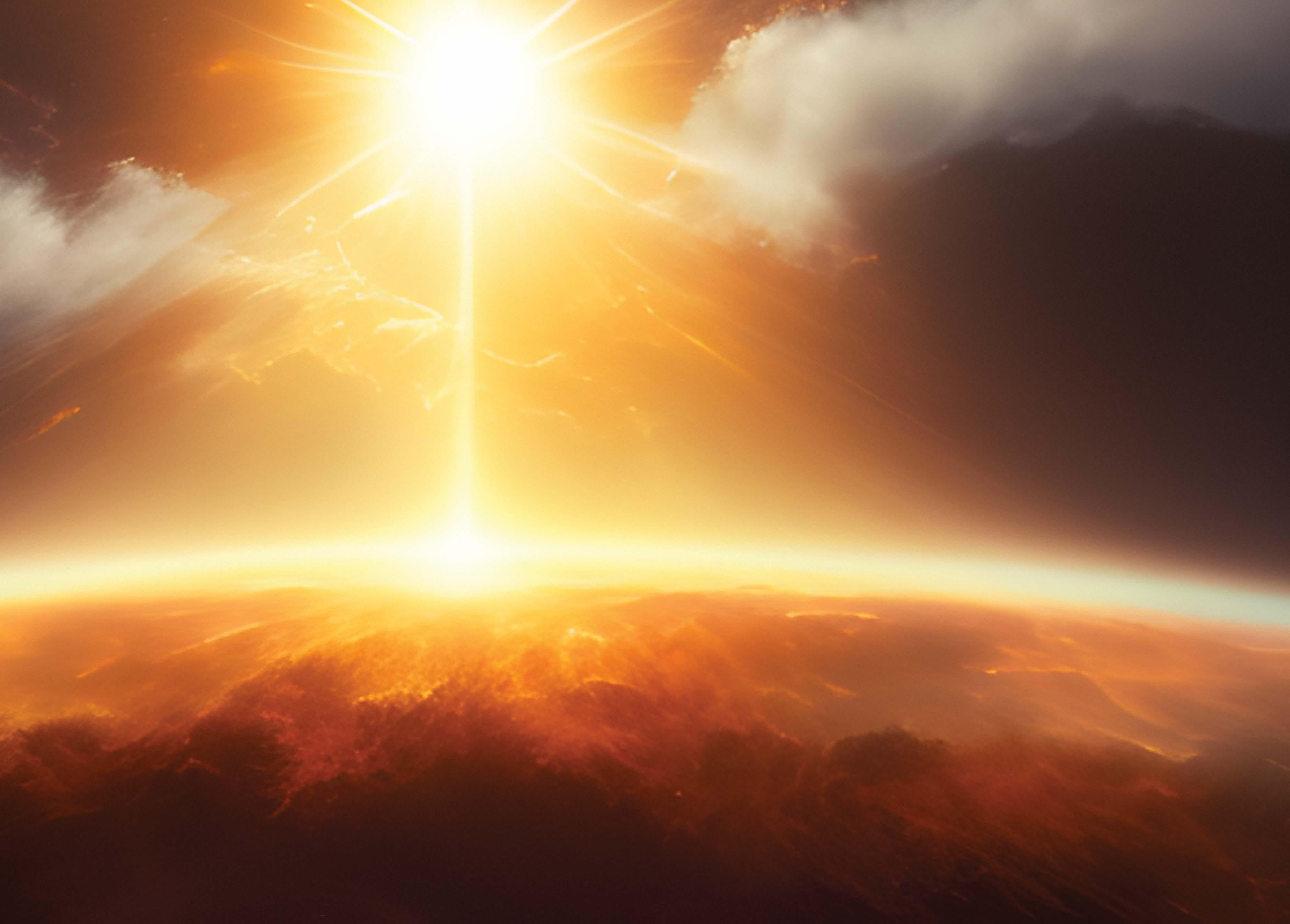
This kingdom reign of Christ, however, manifests itself in ways that contradict human expectations. It was not a “rule all” and “claim all” approach for the early apostles. On the contrary—it was God who always led them to triumph in Christ (2 Corinthians 2:14). But at the same time, Peter, Paul, and James could also rejoice in various adversities, including imprisonment. They could see, on the one hand, Christ the King sitting high and lifted up while sitting in cold prison cells of distant Roman provinces. Yet they also knew His rule when they witnessed the power of God at work, as in Ephesus, where God’s kingdom manifested with unusual miracles, healings, signs, and wonders (Acts 19:11–12).
Being confined to a prison cell was no contradiction to them when they also saw the kingdom of God operating as the pure gospel of the kingdom was being preached. Rather, it was part and parcel of kingdom life. To the Thessalonian believers, Paul even declared their present time of suffering was proof that they had been found “worthy of the kingdom” (2 Thessalonians 1:5).

In his introduction to the book of Revelation, the apostle John places this tension in full view:
I, John, your brother and partner in the tribulation and the kingdom and the patient endurance that are in Jesus, was on the island called Patmos on account of the word of God and the testimony of Jesus. (1:9)
His partnership was both in the kingdom and in tribulation. John further saw the kingdom of God in full completion at the very end of his grand vision. God is dwelling with men. The Bride of the Lamb is a glorified city of Jerusalem coming down from heaven as the Lord wipes away every tear. The early church fathers hoped
will dwell securely. And this is the name by which he will be called: “The Lord is our righteousness.” (Jeremiah 23:5–6)
Thus, today’s restoration of the modern State of Israel is nothing less than God building His platform for a full restoration of His kingdom for Israel, to which the King of kings will soon return. This is the restored kingdom the early disciples longed for—and why the
for this great future manifestation of God’s kingdom. And what they experienced in their respective lives and times was a mere taste “of the powers of the age to come” (Hebrews 6:5). In their spirits, they were already seated with Christ in heavenly places, yet at the same time, they remained in a troubled world full of trauma and drama.
And as they waited for the King to come, they also expected Jesus “to restore the kingdom to Israel” (Acts 1:6). The reason was simple, as they found countless passages that spoke of a restored kingdom for Israel like what they had under King David:
Behold, the days are coming, declares the Lord, when I will raise up for David a righteous Branch, and he shall reign as king and deal wisely, and shall execute justice and righteousness in the land. In his days Judah will be saved, and Israel
annual Jerusalem March during the Feast of Tabernacles is not just a solidarity march for the State of Israel but also a prophetic manifestation of the nations coming up to Jerusalem in recognition of the Lordship of the King of the Jews over their lives. This all means that God encourages us to hope for a great future kingdom, the ultimate hope and goal of our faith.
Still, God expects us to live out the heavenly kingdom reality in the here and now. The theologian George Eldon Ladd captured this reality in the title of his book The Presence of the Future. The task at hand is for us to overcome today’s challenges, or “conquer today,” as some translations put it. While we do not yet live in a perfect world, God expects us to live out his kingdom’s reality in this present darkness, just as Daniel did amid an evil Babylonian system. Daniel saw the King high and lifted up and believed in Him, even though he lived through some of the most difficult hours of Jewish history.
For this reason, this year’s Feast theme sets our eyes on the eternal Kingship of Jesus. We are living in a world with unprecedented challenges. In many nations, the biblical values of family, gender, and personal identity are under severe attack. The pressurizer of the global LGBTQ movement has already been allowed to enter the gates of far too many churches.
In addition, we are facing an unparalleled effort by a global elite to control the world, which made a quantum leap in that direction during
ICEJ TEACHIING
His reign transcends above every poser that might manifest itself on Earth.
9 |WORD FROM JERUSALEM
The apostle Paul in prison, sure of his hope (image © Lars Justinen)
the recent coronavirus pandemic. Even now, the World Health Organization is passing new laws that seek to override the sovereignty of individual nation-states.
An even newer and rapidly growing threat is Artificial Intelligence (AI). Man-made and computer-generated algorithms will soon make critical decisions in hospital operating rooms and even drive our cars. Ominously, in some war zones, AI is already making life-anddeath decisions over human lives. Sure, AI will improve the daily lives of many people and can possibly even save lives, but there already is a dark side to it. The Israeli philosopher Yuval Noah Harari recently suggested that AI write a new holy book that will replace not only the Bible but the holy books of all world religions to establish one truth accepted by all.
At the same time, antisemitism and antiIsraelism are rising in most post-Christian countries. Some are using the World Court of Justice to paint Israel as an apartheid state, which will lead to more boycotts and saddle Israel with pariah status. In addition, other global challenges, such as growing inflation rates, are serious causes for concern even among many believers.

The message amid this chaos is the same for us today as it was in the times of Korah the Psalm writer or Daniel in Babylon: The Lord reigns! Yes, heaven reigns! Our Lord is a great King over all the earth!

God expects us to not just wait for the future glory of His coming but to work in building His kingdom until He comes to take up His earthly throne. That is why the book of Revelation says this about the future inhabitants of the New Jerusalem: “The one who conquers will have
this heritage, and I will be his God and he will be my son” (Revelation 21:7). The question we must ask ourselves is: How are we doing in overcoming and conquering in our dark times? God is looking for those who will stand in the gap in prayer for their chaotic nations.
the
writer
and conquer the land He promised us as an inheritance.
As we do this, we can join in the praises of the great coronation. Psalms 93 to 99 were written in equally challenging times and yet declared: “The Lord reigns, let the earth rejoice!” (Psalm 97:1); “Say among the nations ‘The Lord reigns!’” (Psalm 96:10); “All the ends of the earth have seen the salvation of our God” (Psalm 98:3).
He wants to hear you ask Him, and He will give you nations as an inheritance (Psalm 2:8). He wants us to push the battle back at the gate
Worshipping our God and King at the Feast of Tabernacles 2008 (ICEJ
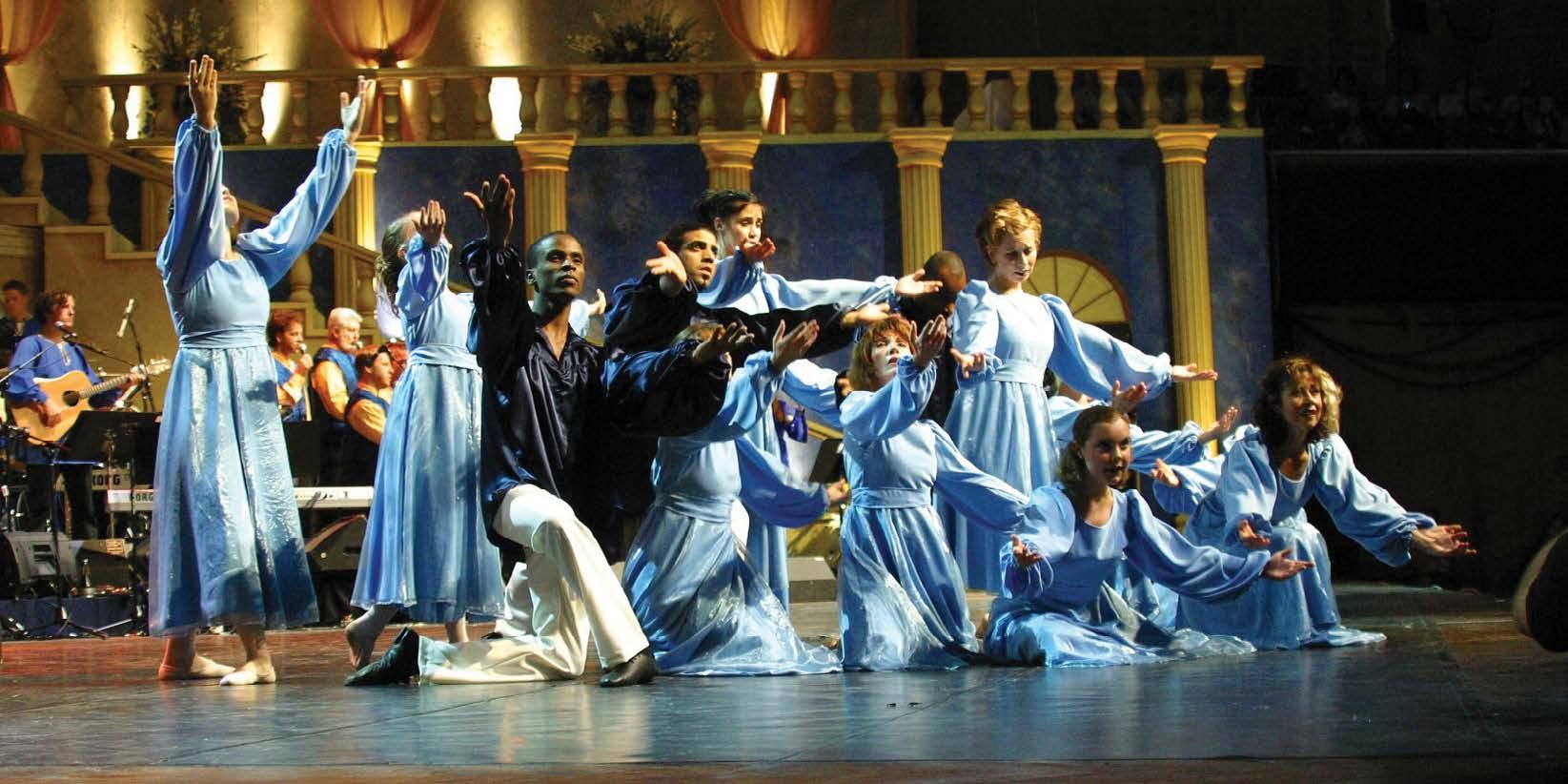

This year, we will have, in a very literal sense, “all the ends of the earth” at the Feast of Tabernacles. They will come to Jerusalem and make a joyful noise before their God and King. They will come from the most northern parts of the earth, from the Arctic regions of Norway, Finland, and Russia. They will come from the southernmost tips of Argentina and South Africa. They will come from the most distant, far-off isles—from Fiji, Tonga, and the Solomon Islands. God’s kingdom rule has extended to these remote regions of the world, and now they are coming to the city of the great King, to pledge afresh their devotion to the King of kings—to Yeshua, our Savior.
No matter how great your challenges are in your nation, remember: heaven rules! No matter how great the mountains of adversity or the impossibility of your situation, tell them: “Who are you, O great mountain? Before Zerubbabel [before Jesus] you shall become a plain” (Zechariah 4:7).
Let us join to conquer and overcome together and live out the purpose of Messiah in redeeming souls and destroying the works of the enemy. Let us carry out great exploits until Jesus comes. May the Lord bless you from Zion as you do so! The Lord reigns!
ICEJ TEACHING
The message amid this chaos is the same for us today as it was in the times of Korah
Psalm
or Daniel in Babylon: The Lord reigns! Yes, Heaven reigns! Our Lord is a great King over all the earth!
photo)
A worship and dance performance at the Feast 2004 (ICEJ photo)
ISRAELI LEADERS EMBRACE CHRISTIAN SUPPORT OF ISRAEL
BY DAVID PARSONS, ICEJ VICE PRESIDENT & SENIOR SPOKESMAN
Though Jewish harassment and assaults on Christians and historic church properties in Israel has increased since the start of the year, including protests against Evangelicals and Messianic Jews at two recent public gatherings, several senior Israeli leaders have criticized these attacks.
Historically, Christians in the Holy Land and the wider Middle East have suffered much more persecution from Muslims, including not only physical attacks but also rapes, forced marriages, and property thefts. Arab Christians have tended to remain silent about these abuses lest they suffer Islamic reprisals. Yet when they are harassed or attacked by Jews, local Arab Christians are vocal about it, so there does seem to be an imbalance in their responses.
Now, however, there has been a dramatic upswing in Jewish harassment of Christians of all backgrounds and denominations, leading to two urgent questions: Who is perpetrating the violence? And why?
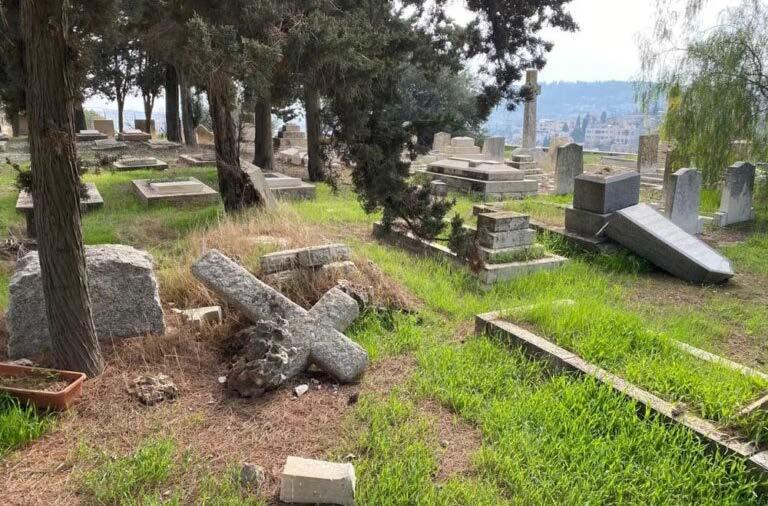
Christian Persecution in the Holy Land
Two main culprits are behind these attacks: a small segment of the
ultra-Orthodox Jewish community in Israel and a radical fringe of the National Religious camp. Many ultra-Orthodox Jews reside in the Jewish Quarter and Mea Shearim neighborhoods in Jerusalem, and some disdain Christians, particularly the distinctly garbed Christian clerics and nuns they run into daily while traversing the narrow streets of the Old City. Added are the many turf battles between Jews, Christians, and Muslims for coveted plots throughout the cramped Old City.
Within Israel’s wider ultra-Orthodox community, there also are several active anti-missionary groups, such as Yad l’Achim and its competitor, Or l’Achim, who ardently oppose assimilation, especially Jews marrying Arabs, as well as any proselytizing of Jews. Many protesters at a recent Evangelical prayer event and Messianic worship concert came from these anti-missionary groups.
Meanwhile, a militant fringe within the National Religious stream is bent on maintaining a strong Jewish majority in the Land, even to the point of wanting to push out Arabs and Christians. Many are followers of the Lehava group—a remnant of the banned Kahanist movement, which is stridently anti-Arab, anti-gay, and anti-Christian—now led by Bentzi Gopstein. Lehava has a long record of assaults, stabbings, and burning churches and symbols of coexistence.
Itamar Ben Gvir, the current Minister of Internal Security who oversees the national police force, grew up in this fringe movement and later, as a lawyer, defended several Lehava followers accused of murder, assault, arson, incitement, and other crimes.
Most of Israel’s current 64-seat governing coalition is from the Religious Right—either ultra-Orthodox or National Religious—and it does appear that some of their constituents feel emboldened to now carry out attacks on Christians, thinking that Ben Gvir and perhaps others in the government will have their backs. This assessment is bolstered by the fact that the recent wave of attacks essentially started around the time the new government came to power in late December 2022.

ICEJ COMMENTARY
11 |WORD FROM JERUSALEM
Protestant cemetery vandalized on Mount Zion (credit: Oliver Hersey)
Israeli Leaders Respond

Several senior Israeli leaders have condemned the spate of Jewish attacks on Christians, led by President Isaac Herzog, who recently visited Stella Maris monastery in Haifa alongside the national police commissioner and strongly denounced the attacks.
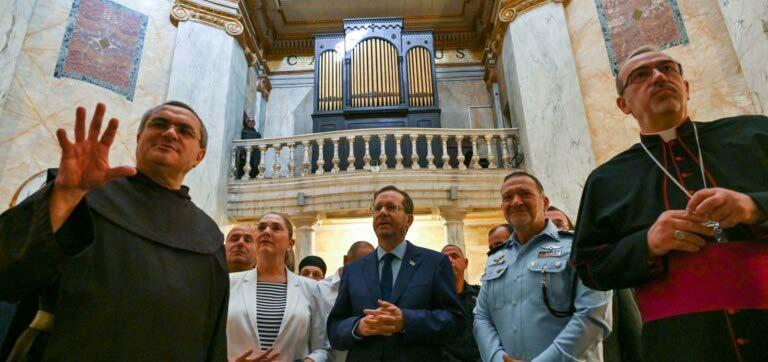
“In recent months we have seen very serious incidents against the Christian denominations in the Holy Land, our brothers and sisters, Christian citizens who feel attacked in the places of prayer, in the cemeteries, on the street,” said Herzog. “I view this phenomenon extremely seriously. It is unacceptable in any way. This phenomenon needs to be uprooted, and I am very grateful to the Israel police and the enforcement agencies for taking this issue seriously. …
“ We must respect the members of all religions,” Herzog said. “We have committed to this since the dawn of our existence. This is the most basic commandment of ‘love your neighbor as yourself.’” Israeli Foreign Minister Eli Cohen commented similarly during a visit to the Vatican in July.
How Should We Respond?
At the International Christian Embassy Jerusalem, we have long espoused the need for Christians to be more aware of the long, tragic history of Christian antisemitism and sensitive to Jewish concerns and fears. We also must recognize that these attacks are largely coming from radical fringe agitators, while most Israelis welcome Christian support and visitors.
Jesus Himself also admonishes us to “love your enemies,” “turn the other cheek,” and “rejoice” when we are persecuted for His sake. This is certainly a test of our professed love for Israel, but the Lord can empower us to indeed love them unconditionally.
“I view this phenomenon extremely seriously. It is unacceptable in any way. This phenomenon needs to be uprooted, and I am very grateful to the Israel police and the enforcement agencies for taking this issue seriously. …
“We must respect the members of all religions,” Herzog said. “We have committed to this since the dawn of our existence. This is the most basic commandment of ‘love your neighbor as yourself.’”
—Israeli President Isaac Herzog
The deputy mayor of Jerusalem, Fleur Hassan-Nahoum, has also spoken out publicly against the harassment of Christians and worked to get prominent Israeli rabbis to do the same.
In May Israel’s Chief Sephardi Rabbi, Shlomo Amar, joined in by condemning these anti-Christian actions in a rare English-language statement: “Irresponsible people who are not at all observant of the Torah and its ways did this. We announce that such behavior is strictly forbidden.”
Jerusalem city officials and police commanders have also met with bishops, patriarchs, and other local Christian leaders to address their grievances.
After witnessing their hatred and anger up close, the ICEJ spoke out recently about the dangers posed by the Lehava group. We do not want to see anyone get seriously hurt—or worse. But we also will continue to have grace toward the Jewish people as a whole.
Indeed, the Bible is clear that Christians should respect and befriend the Jews. Genesis 12:3 says we should “bless” the offspring of Abraham. Isaiah 40 urges us to “comfort” the people of Israel. In Romans 11 the apostle Paul adds that we must “show them mercy!” So we have biblical commands to stand with Israel and be gracious to the Jews. Therefore, we should not condition our support for Israel on whether these attacks end—or not. And we still trust Israeli leaders to confront this problem directly, knowing it only makes it harder for Israel to win friends abroad if the attacks persist. Ultimately, we view this as a moment to show the face and character of God to His own people by demonstrating mercy and grace to them. May we do so with sincere hearts and steadfast confidence that God will complete His redemptive work among His people.
12 | OCTOBER 2023 ICEJ COMMENTARY
President Herzog visits Stella Maris in Haifa. (Credit: Kobi Gideon-GPO)

ICEJ BRINGS UKRAINIAN YOUTH ON LATEST ALIYAH FLIGHT
BY A. HOWARD FLOWER, ICEJ ALIYAH DIRECTOR
In early September, the International Christian Embassy Jerusalem welcomed to Israel a group of 25 Jewish high school students from wartorn Ukraine who arrived at Ben-Gurion Airport on a flight sponsored by our supporters worldwide. This marks the latest Aliyah flight funded by the ICEJ this year for Jewish immigrants leaving the former Soviet republics for safety and hope of a brighter future in Israel—and more such flights are expected in the coming weeks.
The teenage students crossed over from western Ukraine into Poland to catch the flight from Warsaw and begin their new life studying in Israel, away from the raging conflict in their old country. They have tested to qualify for the Naale program, which offers full scholarships to Jewish teenagers from around the world to study for several years at leading high schools in Israel.
The program is jointly funded by Israel’s Ministry of Education and the Jewish Agency for Israel (JAFI) and has a remarkable success rate. Jewish students decide to stay and become Israeli citizens 90 percent of the time, and 60 percent of their parents soon join them in Israel.

The Naale Elite Academy was launched in 1992 with only 50 students from the Former Soviet Union (FSU). Since then, it has expanded to include Jewish students from over 40 countries worldwide, with more than 20,000 Naale participants becoming Israeli citizens.
The unique concept of Youth Aliyah—Jewish parents sending their children to the Land of Israel ahead of them—began in Germany before World War II as a means of rescuing Jewish children from rising antisemitism and offering them a safer life in Mandatory Palestine. The movement was founded by Recha Freier, a rabbi’s wife who wanted
to save Jewish children from the growing Nazi threat. Youth Aliyah coordinators arranged their resettlement in kibbutzim, and youth villages in the Land became their home—and school.
Henrietta Szold, founder of Hadassah, the Women’s Zionist Organization of America, became a key backer of Freier’s initiative, and the group has been a major supporter of Youth Aliyah to this day, as have proIsrael Christians.
In 2005 the ICEJ started assisting Naale students at the request of the Jewish Agency’s senior representative in St. Petersburg, as we expanded our Far Distant Cities initiative to include help for Russian Jewish children preparing to move to Israel. Our efforts soon included Jewish teenagers from Belarus and the Baltic states. In fact, since 2009, the ICEJ has been sponsoring flights, pre-Aliyah logistics and testing, airport transfers, summer camps, and other programs for Naale students from throughout the former Soviet republics—even during the COVID years.
Since the war erupted in Ukraine in 2014, much of our Naale support has focused on helping with Youth Aliyah seminars and retreats for Ukrainian Jewish teens preparing for life in Israel. These children have faced not only physical harm from the long-running war but also have been deprived of a normal childhood.
For 25 Jewish youths who recently landed in Israel, the trajectory of their lives has greatly improved thanks to our generous Christian supporters around the globe. And with your continuing help, the ICEJ will be sponsoring flights for more Naale students from Ukraine and other former Soviet republics in the coming weeks.
Please support the ICEJ’s ongoing Aliyah efforts. Donate today at: www.icejusa.org/aliyah

14 | OCTOBER 2023
ICEJ ALIYAH AND INTEGRATION
OPENING NEW HORIZONS FOR YOUNG ISRAELIS
BY LAURINA DRIESSE, ICEJ HEAD OF MEDIA AND PUBLICATIONS
In only three short years, life drastically changed for Israeli Arab sisters Zara* (24) and Salma* (20). Still reeling from the loss of their mother, they found themselves coping with a dying father. Although they have extended family members, the sisters are not close to them, and they were suddenly left on their own, needing to rent an apartment and feed themselves.
Facing these challenges at only 18, Zara sought the help of an Israeli social worker. Soon she began counselling to deal with the emotional trauma and improve her economic situation. Seeing the value of the counselling, Zara referred her sister Salma for help as well.
“I was confused,” shared Salma. “My life is very complicated. However, together with my social worker, we built a plan. At the beginning, I wasn’t so independent. I lacked self-confidence, and the courses helped me to develop that.”
Salma received assistance through Horizons, a program that is transforming the lives of struggling Jewish and Arab young people in Israel’s periphery. It expands educational opportunities and provides essential tools and support to navigate the university system or complete vocational training and then enter the job market.
The Christian Embassy is sponsoring the Horizons program to help improve the lives of struggling young Israelis, especially in the Arab sector, where 40 percent of those aged 18 to 34 live below the poverty line.

Horizons was launched in 2022 as a new and innovative pilot program, and it quickly mushroomed from 400 young adults to 1,334 participants, including 554 Israeli Arab women and men. These disadvantaged young people lack support in their home or community, and wrestle with self-doubt and lack knowledge about academic programs, the admissions process, and financial assistance.
Horizons can remove barriers that keep young people in poverty. Each participant gets personal guidance from a counsellor to build a customized work plan and advance their education. They also receive help to find scholarships and student stipends, along with ongoing mentoring to ensure they stay the course.
With the ICEJ’s support for laptops, private tutoring, language courses, and study workshops, students can focus on their studies.

Having struggled with obesity throughout her life, Salma expressed a strong interest in embracing a healthier lifestyle. With great determination, she plunged into her fitness workouts and met her own weight goal. She then decided to become a fitness coach to inspire others, and even completed a specialized coaching course. Salma also received a laptop so she could take an online English course.
When Nicole Yoder, ICEJ’s VP for AID & Aliyah, asked about her future dreams, Salma answered: “I have many dreams, and I want others to know and be inspired by my story!”
Meanwhile, Nadia* (20), saw her mother pass away and her father abandon the family. But Horizons has helped her gain confidence and clarify her career path.
Nadia always dreamed of becoming an engineer so she could earn a good living, but had no idea how to reach that goal.
“If you had asked me five years ago about my dreams, I wanted to be an engineer, but I didn’t know what kind” said Nadia. “Then my mother got sick and died from cancer a few years ago. Since then, I’ve wanted to find solutions for illnesses and genetic sensitivities.”
Nadia connected with a Horizons counsellor in her town in northern Israel. After an initial twohour interview, Nadia felt comfortable enough to tell her whole story. Showing potential, Nadia received aid to take a psychometric course and excelled in it. Today she is enrolled to pursue a medical engineering degree at the Technion in Haifa and will begin studies in October.
After meeting these three students, Nicole said: “I came away with the deep conviction that the aid we provide here is life changing.”
Only with your vital support can we impact more Israeli lives and reverse the downward spiral of poverty. Help us give a future and a hope to those in need.
Please give your gift today to:
www.icejusa.org/aid
ICEJ AID
*Names changed to protect privacy 15 |WORD FROM JERUSALEM
PUTTING COLOR BACK INTO TANYA’S LIFE
BY MAXINE CARLILL
When visitors arrive at the hostel for elderly citizens where Tanya lives, they are treated to a display of her beautiful paintings that decorate the hallways. The subjects and textures of this talented artist are amazingly varied. Tanya lived in the same town in Belarus as the famous Marc Chagall, a Russian-French artist, and she has mastered some of his different techniques and styles— in particular, Chagall’s love and use of bright colors. Besides the paintings, her apartment displays a collection of ceramic sculptures she created. Tanya is truly a gifted artist!

Her life, however, has not always been so colorful. Yet it was during the difficult periods that she learned to pray and see her prayers answered. ICEJ Homecare came into her life during one of those down times, and she says: “I will be always thankful for all the help you have been.”
Tanya came from a poor but close-knit family of five. Her father, like his dad before him, was a cobbler who worked day and night to provide for his family. The children had to travel a long way by bus each day to take their father a hot, home-cooked meal. Despite the antisemitism he suffered, people liked his work and were always lined up at his door, even just to have their shoes cleaned. Tanya found it fascinating to watch him, and at age seven, she began to help clean shoes.
She still retains a sweet memory of her father’s homecoming each night when he gave each child a kiss and laid his hands on their head as he said something, which Tanya now realizes was probably a Jewish blessing. Although the family did not observe the Jewish holidays like so many other Jews under the Soviet regime, her father was quite open about his Jewishness. To honor his memory, Tanya recently designed a beautiful Passover Haggadah (Passover Seder guide) for children that traces her father’s story.
Tanya married at 20 years old, and her difficult marriage lasted 17 years. Away from her family and friends and without much money for food for their two sons, Tanya made a vegetable garden and reared rabbits and other small animals. She made warm hats from animal skins for her family for winter. After her husband died from an alcohol-related disease, Tanya returned to her hometown with little means of support.
She eventually made Aliyah to Israel in 1999 with her younger son, then 13. Her older son had encouraged her to go to Israel and wanted to come himself but had to remain in Belarus due to mandatory army service.
“I prayed to God a lot,” Tanya says of that time. Amazingly, her son received an exemption from the army to take part in a special month-long Israeli program. He quickly applied for Israeli citizenship and received it shortly after. He studied Hebrew, found work, and completed his Israeli army service. His work helped his mother, who was struggling financially, until she could earn a small income as an art teacher.
“How does it feel to be in Israel?” we asked Tanya.

“This is my home. I visited Belarus twice with my son to look back to our memories, but I did not enjoy being there,” she replied.
As an artist, Tanya feels right at home in Israel due to the many talented artists here. She also has been especially delighted to learn about Judaism and keep Shabbat and all the Jewish holidays.
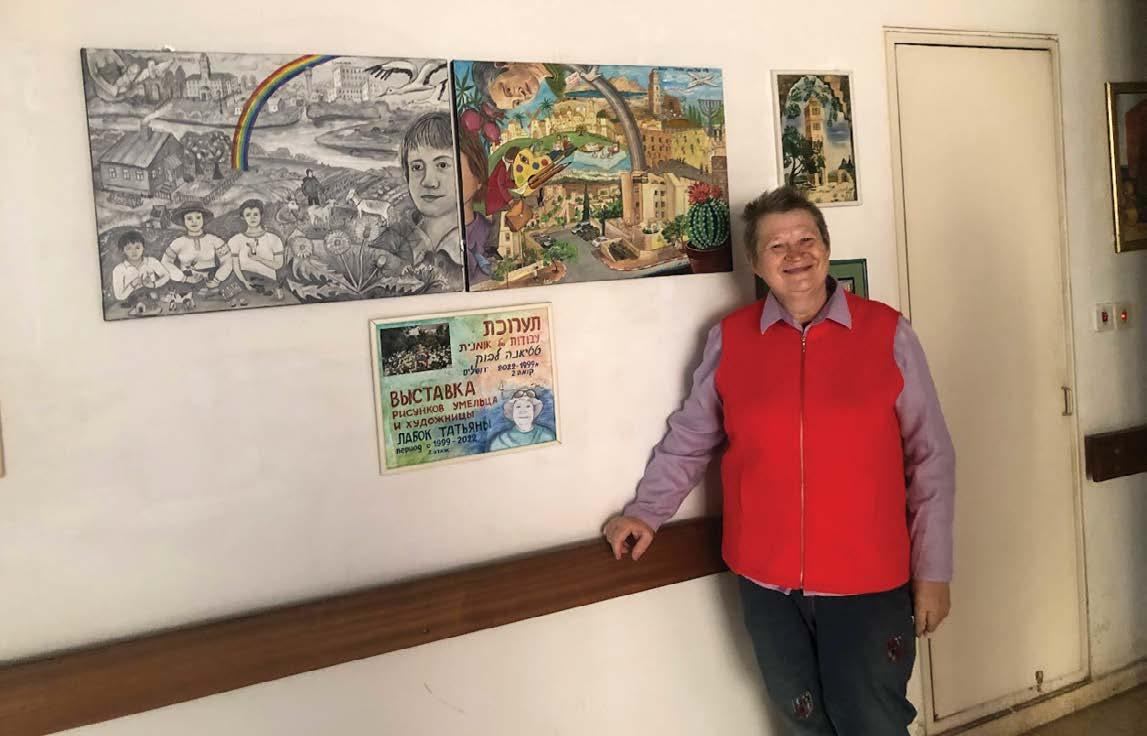

L ife on a small income has still been challenging, and a serious illness brought anxiety and physical debilitation. During this time, she urgently needed to find new housing and feared she may become homeless. But like others under the watchful eye of ICEJ Homecare, Tanya has not walked alone. In partnership with an Israeli social worker, Homecare assisted her financially and helped her search for the subsidized apartment where she now lives. Most importantly, Homecare has provided encouragement and friendship amid her continuing weakness and necessary medication.
Tanya expressed her gratitude, saying: “I don’t know what I would have done without your support—thanks to all the Christians who care.”
Please support the work of ICEJ Homecare by giving at:
www.icejusa.org/homecare
ICEJ HOMECARE
Tanya with her paintings in her new home
Tanya’s colorless painting depicts the drudgery and struggle of her life in Belarus. The brightly colored one represents the vibrant life Israel has brought her.
16 |OCTOBER 2023
www.icej.store
NAHARA DEAD SEA PRODUCTS

1. Body Lotion (8.5 oz)• $13.00*
2. Body Scrub (8.5 oz) • $15.00*
3. Hand Cream (2.9 oz) • $9.00*
4. Hand Wash (11.8 oz) • $12.00*
5. Hand and Body Gift Set • $30.00*
6. Shower Gel (8.5 oz) • $11.00*
MEZUZAH

Silver-colored with a gold-colored “Grafted-in” symbol. Includes the blessing from Deuteronomy.
$9.99
ANOINTING OILS

Cassia, Cinnamon, Frankincense
Henna, Holy Anointing Oil, Prince of Peace, Rose of Sharon
7. Body Mist (8.5 oz) • $15.00* $9.99
72” x 22” prayer shawl with matching bag

I AM ISRAEL: THE BELIEVER’S GUIDE TO THE REBIRTH OF THE PROMISED LAND HARDCOVER COFFEE TABLE BOOK
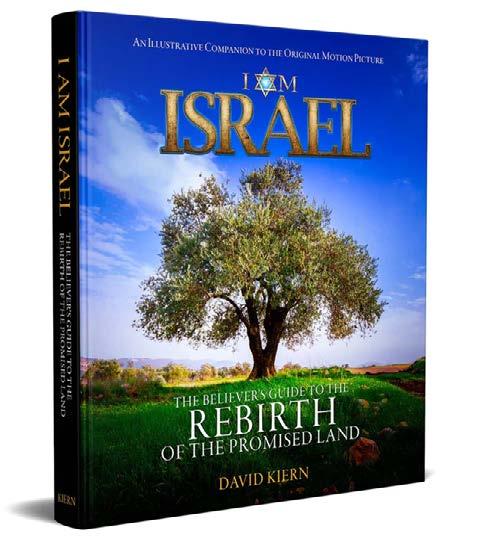
• Explore the epic regions of Jerusalem, Judea, Samaria, the Coastlands, the Galilee, and the Golan Heights.
• Meet Jewish pioneers who are returning to their ancient homeland… just as the Bible foretold thousands of years ago.
• Discover the stories of Christian heroes who played a pivotal role in the reestablishment of the nation of Israel and helped the sons and daughters of Abraham in their greatest time of need.
• Learn about the biblical Feasts—from Passover to the Feast of Tabernacles— and see how they are celebrated in Israel.
• Go behind the scenes of our award-winning documentary, I AM ISRAEL, to learn how we creatively brought the story to life.
Authored by: David Kier

FALL SALE!
VISIT OUR ONLINE STORE AND RECEIVE A 35% DISCOUNT ON ALL PURCHASES

www.ICEJ.store and use the discount code: “FALL.”
$60.00*
For full product descriptions, visit our online store!
NEW COVENANT PRAYER SHAWL
$25.00*
Your Israel Answer

What Are Antisemitic Tropes—and Are They Happening Today?
Part 1 in a 2-Part Series
By Dr. Susan Michael, ICEJ USA Director
An antisemitic trope is a myth or sensational report, misrepresentation, or lie defamatory toward Judaism or the Jewish people as an ethnic or religious group. This twopart series will first discuss the critical role these untruths play in increasing antisemitism, and then in part two, specific tropes of which everyone should be aware.
Before the Holocaust
In 1933 Time magazine featured a picture of Dr. Paul Joseph Goebbels on its front cover. Goebbels was a German Nazi politician, one of Adolf Hitler’s closest followers, and the chief propagandist for the Nazi party. Under Goebbels’ image was his quote: “The Jews Are to Blame!” That was a decade before the Holocaust, which killed 6 million Jews, and just one instance of countless other lies about the Jewish people that played a part in shifting people’s attitudes toward the Jewish people before the Holocaust.
Ten years earlier, Julius Streicher started publishing the virulently antisemitic German tabloid Der Stürmer, published until the end of World War II. The newspaper often described how to identify Jewish people, included racist political cartoons and antisemitic caricatures, and focused on imaginary fears and exaggerations— like medieval stereotypes accusing Jews of killing children, sacrificing their bodies, and drinking their blood. Over time, these articles and images subtly shifted people’s perceptions of Jews, whom Streicher portrayed as an inferior race. By 1938 his publishing house was producing other antisemitic works, including the infamous German children’s book Giftpilz (The Poisonous Mushroom)
Articles became more malicious in Der Stürmer once the war began, many demanding the annihilation and extermination of the “Jewish race.”
The Nazis used such propaganda to rally the Germans to support
the persecution of Jews, war, and ultimately, genocide. By the time of the Holocaust, these stereotypes and images were so familiar that people didn’t realize they had adopted such erroneous views as truth.
Modern-Day Antisemitic Tropes
One would think this no longer happens in twenty-first-century America, yet the opposite is true. Antisemitism is skyrocketing. The Anti-Defamation League (ADL) reported 3,697 antisemitic incidents in the United States in 2022, the highest number ever recorded since the ADL began tracking them in 1979. In the 2023 ADL Antisemitic Attitudes in America report, 20 percent of Americans believe six or more antisemitic tropes that feed antisemitism, an increase from 11 percent in 2019.
During the COVID-19 debacle, for example, the phrase “poisoning the well” reemerged, blaming Jews for spreading the virus, a trope the ADL says “echoes the medieval trope that Jews were responsible for spreading the Bubonic Plague in Europe.” This myth led to the use of the term “Holocough” across social media—a call to infect and kill Jews with COVID.
The “deadly exchange” myth recently surfaced too. The ADL states this untruth “claimed that training exercises between the US and Israeli police forces fueled American police brutality against Black Americans by promulgating tactics allegedly used against Palestinians.” A 2021 article by the American Jewish Committee (AJC) stated this gross analogy “appeared in demonstrations … when protesters chanted ‘Israel, we know you—you murder children, too.’”
The increase in antisemitic incidents and the rise of repackaged lies and conspiracies are disturbing and verify how critical it is for Christians to understand what antisemitic tropes are and speak out against them, so history does not repeat itself.
Learn about specific antisemitic tropes in Part 2 of this series in the November issues of Word From Jerusalem.
Source: “Antisemitism Uncovered: A Guide to Old Myths in a New Era.” Anti-Defamation League, 2023.
18 | SEPTEMBER/OCTOBER 2020 18 |OCTOBER 2023
Get your questions about Israel answered at: www.israelanswers.com
SEND A GIFT FOR ISRAEL’S 75TH
Weare thrilled to be celebrating this year the 75th anniversary of Israel’s rebirth as a nation on May 14, 1948. The Jewish State and people have overcome so much since God began regathering them to their ancestral homeland according to His covenant promises.


The International Christian Embassy Jerusalem has been standing at Israel’s side for 43 years now, and we have witnessed the power of God’s Word at work in the way Christians worldwide have responded to the prophetic call of Scripture to be involved in this great ingathering.
As scores of Jewish exiles have made the journey home to the Land of Israel, Christians have partnered with our ministry to help 180,000 of them reach the promised land.
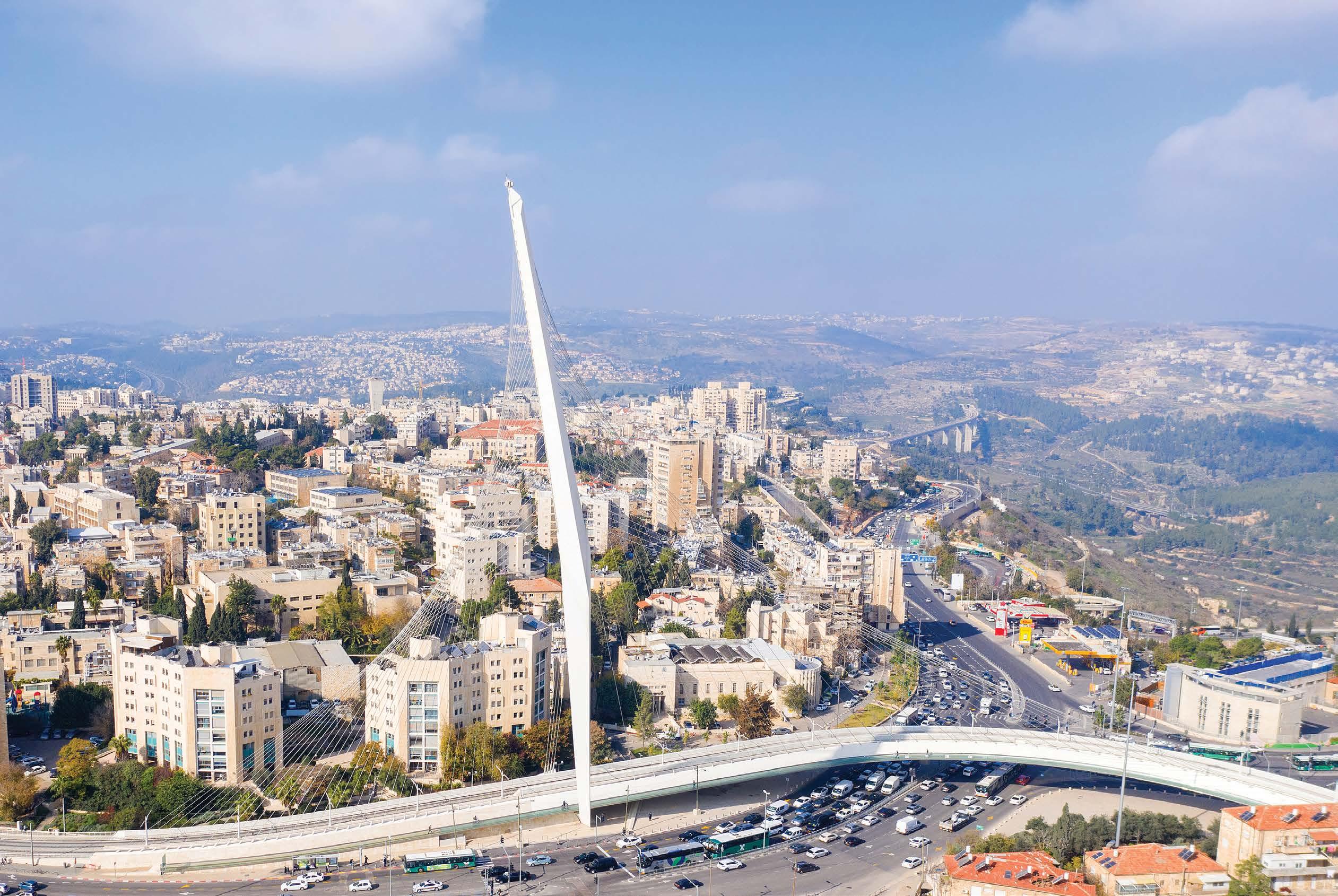
Among the Jews returning to the Land are many Holocaust Survivors, and Christians worldwide have assisted us in caring for them.
Israel also has faced many times of crisis and war in the Land and yet always emerged victorious, with the support and admiration of their Christian friends. In recent years, this support has often taken the form of portable bomb shelters provided to Israeli communities vulnerable to the constant threat of rocket attacks.
On Israel’s 75th anniversary, we want to encourage you to consider sending a birthday gift of $75 to mark this special occasion. These gifts will be used to continue our vital work in Israel, such as sponsoring more Aliyah flights, caring for needy Holocaust Survivors, and providing more bomb shelters for Israeli communities under serious rocket threat.
www.icejusa.org/donate-online
L
OOKING FOR A FALL BIBLE STUDY?
Dr. Susan Michael’s Encounter the 3D Bible: How to Read the Bible So It Comes to Life STUDY GUIDE is now available! This guide is designed to help group leaders facilitate discussion based on her book by the same title, alongside the videos in the Encounter the 3D Bible course at www.iceju.org.

U se this guide with a group or on your own—it’s a wonderful aid for personal study, journal prompts, and reflection.
Get your copy on Amazon or at www.icejusa.org/store today!
TODAY
DONATE
AT:
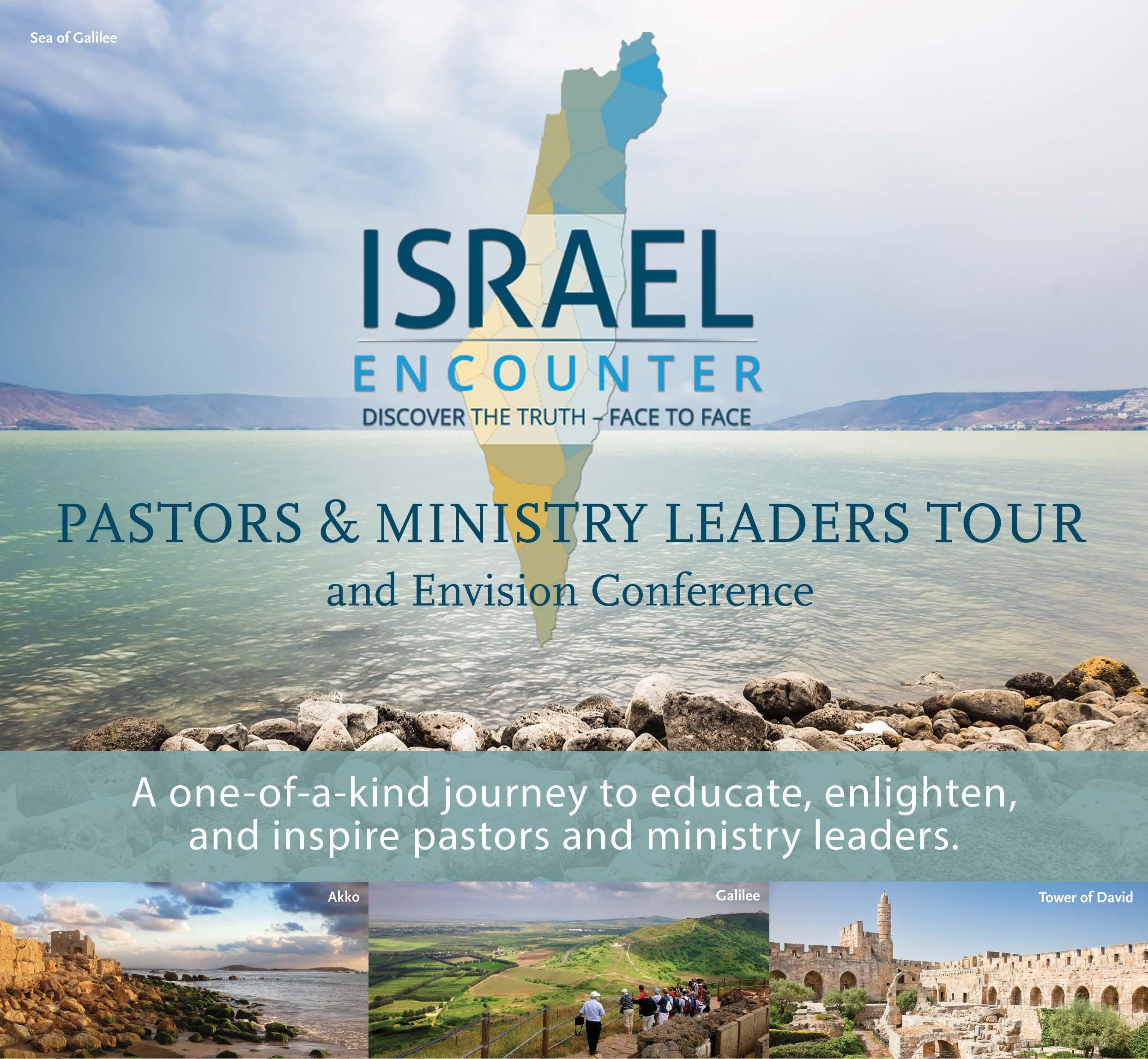

TOUR ISRAEL WITH OTHER PASTORS AND LEADERS ENVISION CONFERENCE • Meet, pray, and fellowship with church and ministry leaders from around the world • Hear from proven Christian leaders about how God is leading them in our day • Learn more about Israel’s amazing modern-day restoration • Engage with Israeli officials, community leaders, and local pastors Tour Sites: Caesarea Maritima • Mt. Carmel • Tel Dan • Capernaum Sea of Galilee • Mount of Beatitudes • Jordan River Baptism Masada • Camel Ride • Mount of Olives • Jerusalem’s Old City Garden Tomb • Temple Mount • Yad Vashem • City of David Western Wall • and many more INTERNATIONAL CHRISTIAN EMBASSY JERUSALEM PO Box 332974, Murfreesboro, TN 37133 • (615) 895-9830 tours@icejusa.org • Register at: www.icejusa.org/envision JANUARY 23 – FEBRUARY 1, 2024

















 BY DR. JUERGEN BUEHLER, ICEJ PRESIDENT
BY DR. JUERGEN BUEHLER, ICEJ PRESIDENT





























